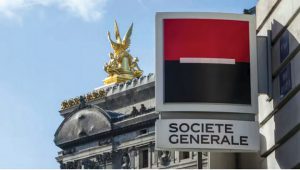Bloomberg
Societe Generale SA benefited from higher interest rates and market volatility in the first quarter, helping offset rising costs as the French lender
prepares to exit its Russian business.
Revenue in the first three months rise 17%, beating analysts’ estimates, driven by its international banking operations, gains in French retail banking and across investment banking units.
The Paris-based bank said that provisions for bad loans this year will be higher than it had expected, while the cost of its exit from Russia will hit earnings once completed.
Chief Executive Officer Frederic Oudea is seeking to lead SocGen into calmer waters after a roller-coaster performance over the past years. The bank rebounded with a record profit from losses at the onset of the pandemic, only to be hit by the fallout from sanctions against Russia, where it is one of the most exposed lenders. Last month, it agreed to sell its local unit Rosbank to Russian billionaire Vladimir Potanin.
“We are moving ahead smoothly with the closing process,†Oudea said in an interview on Bloomberg TV. Asked about the risk of Potanin being sanctioned before the transaction is complete, the CEO said SocGen “would probably request a license†if that was the case.
SocGen said the Russia exit, which should be finalised in the coming weeks, will result in a financial hit of about 3.1 billion euros ($3.3 billion), in line with guidance from last month. The bank’s common equity Tier 1 ratio will be reduced by about 20 basis points, though 14 basis points of that were already accounted for in the first quarter, Oudea said on Bloomberg TV.
The uncertainty caused by the war in Ukraine prompted the bank to postpone the announcement of new medium-term targets until the publication of second-quarter results, Oudea said on a call with reporters.
Italy’s UniCredit SpA, another European lender with a relatively large exposure to Russia, put 1.2 billion euros aside against defaults in Russia and wrote down the value of its business there by 600 million euros, it said in a statement.
At SocGen, provisions for bad loans came in below analysts’ estimates in the quarter. At the same time, the bank raised its guidance for the full year to between 30 and 35 basis points, from less than 30 basis points.
Operating expenses rose more than analysts had estimated, with the bank saying the increase reflects “variable costs linked to the growth in revenues†and regulatory levies. That echoed comments by Deutsche Bank AG a week ago, which said that cost reductions targeted for this year are being eaten up partly by wage inflation.
For now, revenue gains are making up for the increase. Top line earnings at the French retail banking operations rose 8.2% while the international unit recorded 19% higher revenue. That confirmed a trend seen at lenders from UBS Group AG to HSBC Holdings Plc and Banco Santander SA, which all highlighted the benefit of higher rates.
At the investment bank, fixed-income trading rose 22% from a year earlier and equities trading gained about 20%. Both units were ahead of Wall Street peers, even though SocGen couldn’t quite keep up with local rival BNP Paribas SA, which has aggressively expanded in equities over the past years.
The trading results show “the success of the hard work we had on the business,†Oudea said. “We are confident going forward to deliver very good performances on our market activities.â€
 The Gulf Time Newspaper One of the finest business newspapers in the UAE brought to you by our professional writers and editors.
The Gulf Time Newspaper One of the finest business newspapers in the UAE brought to you by our professional writers and editors.
